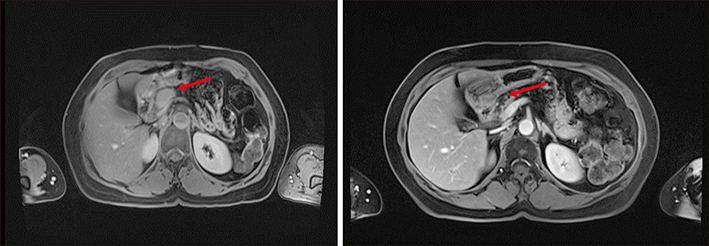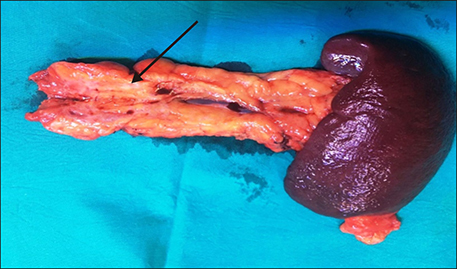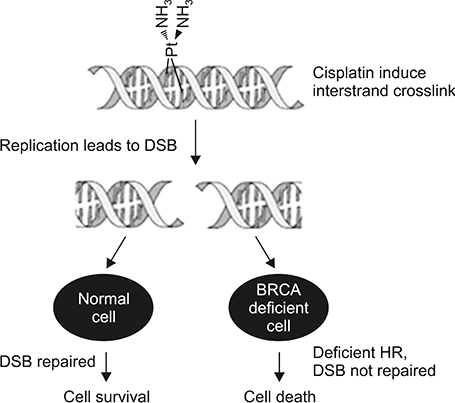Ann Hepatobiliary Pancreat Surg.
2019 May;23(2):200-205. 10.14701/ahbps.2019.23.2.200.
Impact of BRCA1/2 gene mutations on survival of patients with pancreatic cancer: A case-series analysis
- Affiliations
-
- 1Department of General and Digestive Surgery, Hospital Universitario Madrid Sanchinarro, Madrid, Spain. drbarzola@gmail.com
- 2Department of Surgery and General Surgery, Shupyk National Medical Academy of Postgraduate Education, Kyiv, Ukraine.
- 3Department of Pathology, Hospital Universitario Madrid Sanchinarro, Madrid, Spain.
- KMID: 2448778
- DOI: http://doi.org/10.14701/ahbps.2019.23.2.200
Abstract
- BRCA gene mutations are found in up to 10% of pancreatic adenocarcinoma cases. We present a description of 4 cases along with a review of the current literature regarding pathogenesis, target treatment, response and survival rates in these types of malignancies. We describe four cases of pancreatic adenocarcinoma, in three of which the BRCA2 mutation was identified, in one - BRCA1 gene alteration. Two patients underwent surgery following the neoadjuvant treatment with Folfirinox and radiotherapy; in the first case, a distal pancreatectomy with splenectomy was performed and in the second one - the Whipple's procedure. In both cases, a complete pathological response was reported. Other 2 patients were treated with Folfirinox after BRCA mutation identification and acceptable life expectancy was obtained. The association of pathologic complete response (PCR) with lower rates of local recurrence and better survival in patients with various types of adenocarcinomas is well known. Identification of such patients carrying BRCA mutations could provide an application of better personalized treatment. In some patients with pancreatic cancer, especially when there is clinical or demographic reason to suspect a genetic predisposition, a confirmation of the presence of BRCA mutations could provide an opportunity to use target treatment with beneficial outcomes regarding survival.
Keyword
MeSH Terms
Figure
Reference
-
1. Siegel RL, Miller KD, Jemal A. Cancer statistics, 2015. CA Cancer J Clin. 2015; 65:5–29.
Article2. Permuth-Wey J, Egan KM. Family history is a significant risk factor for pancreatic cancer: results from a systematic review and meta-analysis. Fam Cancer. 2009; 8:109–117.
Article3. Moran A, O'Hara C, Khan S, Shack L, Woodward E, Maher ER, et al. Risk of cancer other than breast or ovarian in individuals with BRCA1 and BRCA2 mutations. Fam Cancer. 2012; 11:235–242.
Article4. Goggins M, Schutte M, Lu J, Moskaluk CA, Weinstein CL, Petersen GM, et al. Germline BRCA2 gene mutations in patients with apparently sporadic pancreatic carcinomas. Cancer Res. 1996; 56:5360–5364.5. Iqbal J, Ragone A, Lubinski J, Lynch HT, Moller P, Ghadirian P, et al. The incidence of pancreatic cancer in BRCA1 and BRCA2 mutation carriers. Br J Cancer. 2012; 107:2005–2009.
Article6. Matsubayashi H, Takaori K, Morizane C, Maguchi H, Mizuma M, Takahashi H, et al. Familial pancreatic cancer: concept, management and issues. World J Gastroenterol. 2017; 23:935–948.
Article7. Golan T, Kanji ZS, Epelbaum R, Devaud N, Dagan E, Holter S, et al. Overall survival and clinical characteristics of pancreatic cancer in BRCA mutation carriers. Br J Cancer. 2014; 111:1132–1138.
Article8. Lowery MA, Kelsen DP, Stadler ZK, Yu KH, Janjigian YY, Ludwig E, et al. An emerging entity: pancreatic adenocarcinoma associated with a known BRCA mutation: clinical descriptors, treatment implications, and future directions. Oncologist. 2011; 16:1397–1402.9. Sonnenblick A, Kadouri L, Appelbaum L, Peretz T, Sagi M, Goldberg Y, et al. Complete remission, in BRCA2 mutation carrier with metastatic pancreatic adenocarcinoma, treated with cisplatin based therapy. Cancer Biol Ther. 2011; 12:165–168.
Article10. Fogelman D, Sugar EA, Oliver G, Shah N, Klein A, Alewine C, et al. Family history as a marker of platinum sensitivity in pancreatic adenocarcinoma. Cancer Chemother Pharmacol. 2015; 76:489–498.
Article11. Murphy KM, Brune KA, Griffin C, Sollenberger JE, Petersen GM, Bansal R, et al. Evaluation of candidate genes MAP2K4, MADH4, ACVR1B, and BRCA2 in familial pancreatic cancer: deleterious BRCA2 mutations in 17%. Cancer Res. 2002; 62:3789–3793.12. Ryan DP, Hong TS, Bardeesy N. Pancreatic adenocarcinoma. N Engl J Med. 2014; 371:1039–1049.
Article13. Greer JB, Whitcomb DC. Role of BRCA1 and BRCA2 mutations in pancreatic cancer. Gut. 2007; 56:601–605.
Article14. Holter S, Borgida A, Dodd A, Grant R, Semotiuk K, Hedley D, et al. Germline BRCA mutations in a large clinic-based cohort of patients with pancreatic adenocarcinoma. J Clin Oncol. 2015; 33:3124–3129.
Article15. Malone KE, Daling JR, Doody DR, Hsu L, Bernstein L, Coates RJ, et al. Prevalence and predictors of BRCA1 and BRCA2 mutations in a population-based study of breast cancer in white and black American women ages 35 to 64 years. Cancer Res. 2006; 66:8297–8308.
Article16. Tun NM, Villani G, Ong K, Yoe L, Bo ZM. Risk of having BRCA1 mutation in high-risk women with triple-negative breast cancer: a meta-analysis. Clin Genet. 2014; 85:43–48.
Article17. Couch FJ, Farid LM, DeShano ML, Tavtigian SV, Calzone K, Campeau L, et al. BRCA2 germline mutations in male breast cancer cases and breast cancer families. Nat Genet. 1996; 13:123–125.
Article18. Alsop K, Fereday S, Meldrum C, deFazio A, Emmanuel C, George J, et al. BRCA mutation frequency and patterns of treatment response in BRCA mutation-positive women with ovarian cancer: a report from the Australian Ovarian Cancer Study Group. J Clin Oncol. 2012; 30:2654–2663.
Article19. Ielpo B, Caruso R, Duran H, Diaz E, Fabra I, Malavé L, et al. A comparative study of neoadjuvant treatment with gemcitabine plus nab-paclitaxel versus surgery first for pancreatic adenocarcinoma. Surg Oncol. 2017; 26:402–410.
Article20. Golan T, Sella T, O'Reilly EM, Katz MH, Epelbaum R, Kelsen DP, et al. Overall survival and clinical characteristics of BRCA mutation carriers with stage I/II pancreatic cancer. Br J Cancer. 2017; 116:697–702.
Article21. Zhao Q, Rashid A, Gong Y, Katz MH, Lee JE, Wolf R, et al. Pathologic complete response to neoadjuvant therapy in patients with pancreatic ductal adenocarcinoma is associated with a better prognosis. Ann Diagn Pathol. 2012; 16:29–37.
Article22. Vyas O, Leung K, Ledbetter L, Kaley K, Rodriguez T, Garcon MC, et al. Clinical outcomes in pancreatic adenocarcinoma associated with BRCA-2 mutation. Anticancer Drugs. 2015; 26:224–226.
Article23. Gostimir M, Bennett S, Moyana T, Sekhon H, Martel G. Complete pathological response following neoadjuvant FOLFIRINOX in borderline resectable pancreatic cancer - a case report and review. BMC Cancer. 2016; 16:786.
Article
- Full Text Links
- Actions
-
Cited
- CITED
-
- Close
- Share
- Similar articles
-
- The Prevalence of Founder Mutations among Individuals from Families with Familial Pancreatic Cancer Syndrome
- Prognostic implications of ductal carcinoma in situ components in BRCA1/2-positive breast cancer: a retrospective cohort study
- Self-Concept and Psychosocial Well-Being among Korean Women with BRCA1/2 Gene Mutations
- Distribution of BRCA1 and BRCA2 Mutations in Asian Patients with Breast Cancer
- Germline Mutations of BRCA1 Gene in Korean Breast and/or Ovarian Cancer Families





